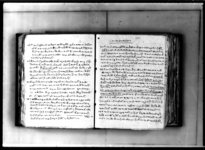A copy of a royal order appointing Sīu Narasīṃ as a ḍiṭṭhā to oversee the management of Patan's Matsyendranātha Guṭhīs (VS 1863)
ID: RRC_0005_0159
Edited and
translated by Manik Bajracharya
in collaboration with
Pabitra Bajracharya
Created: 2021-01-06;
Last modified: 2023-08-23
For the metadata of the document, click here
The accompanying edition, translation/synopsis and/or commentary are available under the terms of the Creative Commons Attribution-ShareAlike 4.0 International License
Abstract
The document of which this is a copy appoints Sīu Narasīṃ as ḍiṭṭhā and entrusts him with continuing to carry out all the activities of Patan’s Matsyendranātha guṭhīs that had been carried out by biseṭs up till then. There is another copy of this document available in the NGMPP microfilms under the identification K_0343_0005.Diplomatic edition
[100]
1मार्गवदी१२रोज१1३५नं.1आगेसीउनरसींकेपाटं1 श्रीमत्छेन्द्रनाथको2 गुठका3 डीठ्ठा42वसेट्हरूलाईविसेट्हरूलाई5 ∙थीतीवीतीकोमोहरगरीवक्स्य़ाकोहो∙तीनीहरू
3ले—श्रीकोधनमालहीनामिना∙पार्दातेसजगाकोडीठाई
4मान6 ∙तलाईवक्स्य़ौं∙परापुर्वदेखी7 चलीआय़ाको¯¯¯कामकाज
5चलाई∙आफ्नुडीठाईमान∙दैदस्तुरलीभोग्य़गर¯¯¯कोकामकाज
6चलाई8 ∙परापुर्वकारितीवमोजिम∙झारावेठवेगारीमाफगरी
7वक्सेकोछ∙इतीमीतीसदर¯¯¯
Translation
[1r]
Sunday, the 12th of the dark fortnight of the month of Mārga [in the year VS 1863 (1806 CE)].
No. 359
Āge: To Sīu Narasīṃ.
[We earlier] issued a mohara to the ḍiṭṭhābiseṭs of the guṭhas of the glorious Matsyendranātha (text: Matchendranātha) of Patan, granting [them] overseership of the affairs [relating to the deity]. Since they have mismanaged the property of Śrī (i.e., Matsyendranātha), we have granted you a ḍiṭṭha's honour (īmāna) in their stead. Carry out the work [relating to Matsyendranātha]10 that has traditionally been done; receive and you yourself enjoy the customary fees (daidastura) [that come with] a ḍiṭṭhā's honour. For your work relating to [Matsyendranātha], we have, following tradition, exempted you from [the compulsory labour obligations of] jhārā, beṭha and begārī. The date is valid.
Commentary
The royal order of which this is a copy instates a certain Sīu Narasīṃ to the post of ḍiṭṭhā in service to Matsyendranātha (Buṅgadyaḥ). As with most documents in RRC volumes, the copyist missed out the praśasti of the king and the year of issuing. Page 98 of the current RRC volume 5 reveals that the original document was being kept in a bundle numbered 5 and with a register number 23 among a batch of documents issued in VS 1863. We can, therefore, conclude that the issuing king was Gīrvāṇayuddha Vikrama Śāha (r. 1799–1816 CE).
The document refers to an earlier mohara issued to biseṭs without mentioning any names and the date of issue. This mohara is probably the document K_0341_0018, which appointed three former biseṭs from traditional biseṭ families to the rank of ḍiṭṭhā in service to the deity in Bhādra VS 1862, fifteen months before the current document.
The newly appointed Sīu Narasīṃ is made a ḍiṭṭhā at the same time others were removed from their post, that of ḍiṭṭhā biseṭ. Therefore, it may be inferred that Sīu Narasīṃ did not come from a family of traditional biseṭs, and this latter position was being replaced by a state-chosen one, that of a ḍiṭṭhā. It is uncertain, however, whether the current document is the first such appointment. DNA_0014_0106, another document, dated VS 1895 (1839 CE), reveals that biseṭs remained associated with the Matsyendranātha guṭhī, but that they had no real authority, ḍiṭṭhās handling all affairs.
For an earlier translation of this document, see M.C. Regmi 1974: 129. Another copy of this document can be found in the NGMPP microfilm under the identification K_0343_0005.

